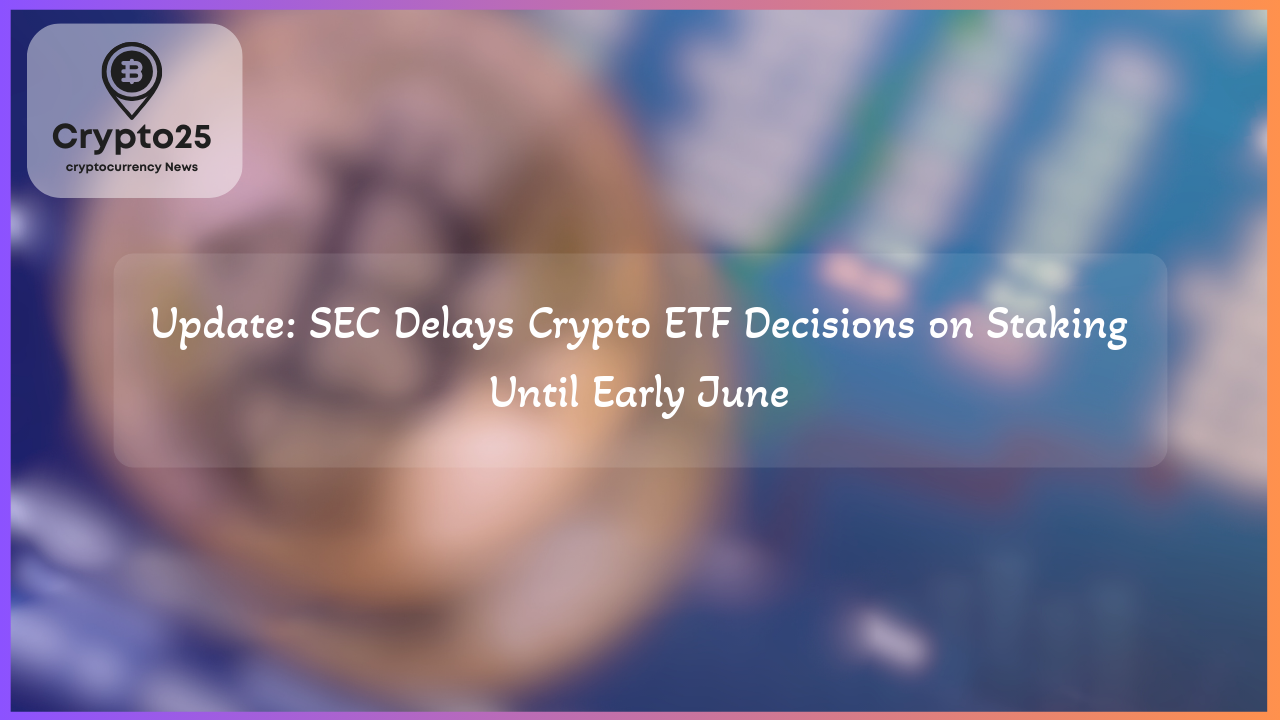
The U.S. Securities and Exchange Commission (SEC) has officially extended its decision-making timeline for two critical crypto exchange-traded fund (ETF) proposals. These amendments, relating to Ethereum staking and in-kind redemptions for Bitcoin and Ethereum ETFs, are now set to be reviewed further into 2025. This delay underscores the complexity of regulatory processes in the cryptocurrency space, particularly surrounding innovative financial products.
### SEC Postpones Decision on Crypto ETFs: What It Means for the Market
In an announcement dated April 14, the SEC formalized its decision to delay rulings on Grayscale’s Ethereum Trust staking proposal and VanEck’s in-kind redemptions framework for Bitcoin and Ethereum ETFs. Grayscale’s filing, which aims to facilitate staking for their Ethereum trust, alongside VanEck’s intention to allow digital asset-based creations and redemptions, represents a significant shift in the ETF landscape. However, the SEC has deemed it necessary to extend its review period, setting new deadlines: June 1, 2025, for Grayscale’s proposal and June 3, 2025, for VanEck’s in-kind model.
This development highlights the SEC’s cautious approach when evaluating digital asset products and their alignment with existing securities regulations. By invoking Section 19(b)(2) of the Securities Exchange Act of 1934, the Commission cited the need for additional time to analyze these proposals. This move has drawn attention from global investors and policymakers, adding another layer of anticipation to an already intricate regulatory landscape.
### Implications of the SEC’s Delay on Ethereum Staking ETFs
Grayscale’s proposal introduces staking for Ethereum within its ETF framework, enabling a portion of held ETH to be staked. Initially filed on February 14, 2025, and published in the Federal Register on March 3, this amendment seeks to incorporate a feature largely associated with decentralized finance into traditional investment products. The SEC’s revised timeline, however, reflects its commitment to addressing potential challenges regarding investor protection and compliance with federal securities laws.
This proposed functionality could significantly impact investor interest, as staking presents an opportunity to earn rewards on held assets. At the same time, regulators must examine how this feature fits within broader fiduciary obligations and how custodianship risks might be mitigated. Such considerations are central to the SEC’s extended review process, with echoes of past regulatory hesitations over novel crypto innovations.
| Title | Details |
|---|---|
| Market Cap | $1.2 Trillion |
As the June 2025 deadline approaches, industry participants are eagerly awaiting signs of the SEC’s leanings on this matter. The outcome could signal how U.S. regulators may treat staking-related ETF proposals in the future, potentially setting a precedent for other markets worldwide.
### Understanding the SEC’s Stance on In-Kind ETF Redemptions
The SEC’s review of VanEck’s amendment pertains to changes in how ETF shares can be created and redeemed. Specifically, it allows the use of digital assets like Bitcoin (BTC) and Ethereum (ETH) instead of cash. This pioneering model was initially submitted on February 19, 2025, and published on March 5. Like Grayscale, VanEck’s proposal also faced initial deadlines in April but was pushed back for more detailed evaluation, as regulators align these innovative mechanisms with existing frameworks.
For investors, the in-kind redemption model could provide a more seamless interaction with the cryptocurrency market by reducing friction between traditional finances and digital ecosystems. However, the lack of public commentary to date, as seen in federal filings, might factor into the Commission’s cautious stance. The SEC may also be exploring how these amendments could impact market stability and liquidity in a sector marked by pricing volatility.
Looking ahead, the upcoming deadline extension could open the door for deeper analyses and potential industry insights. Whether the SEC will use this time to initiate formal proceedings or conclude approvals remains a topic of avid speculation within the financial community.
### The Path Forward for Crypto ETFs and Regulatory Acceptance
The SEC’s decision to delay both staking and in-kind redemption proposals vividly illustrates the intricate balance regulators must achieve when dealing with cryptocurrency-driven innovation. While these ETFs could revolutionize retail and institutional access to digital assets, the Commission’s emphasis on compliance serves as a reminder of the industry’s growing pains.
As we await the verdict on these critical proposals, the extended timelines highlight the importance of market consultation and careful scrutiny for emerging financial models. Whether these delays are a harbinger of more robust crypto-friendly policies—or simply cautionary measures—remains to be seen. For now, the market can only watch and adapt accordingly.
